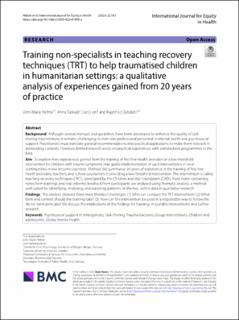| dc.contributor.author | Heltne, Unni Marie | |
| dc.contributor.author | Sarkadi, Anna | |
| dc.contributor.author | Lien, Lars | |
| dc.contributor.author | Dybdahl, Ragnhild | |
| dc.date.accessioned | 2023-10-11T09:09:53Z | |
| dc.date.available | 2023-10-11T09:09:53Z | |
| dc.date.created | 2023-09-27T14:35:17Z | |
| dc.date.issued | 2023-09-11 | |
| dc.identifier.issn | 1475-9276 | |
| dc.identifier.uri | https://hdl.handle.net/11250/3095729 | |
| dc.description.abstract | Background: Although several manuals and guidelines have been developed to enhance the quality of task-sharing interventions, it remains challenging to train non-professional personnel in mental health and psychosocial support. Practitioners must translate general recommendations into practical applications to make them relevant in demanding contexts. However, limited research exists on practical experiences with standardised programmes in the field.
Aim: To explore how experiences gained from the training of first-line health providers in a low-threshold intervention for children with trauma symptoms may guide implementation of such interventions in local communities in low-income countries. Method: We summarise 20 years of experience in the training of first-line health providers, teachers, and school counsellors in providing a low-threshold intervention. The intervention is called teaching recovery techniques (TRT), developed by the Children and War Foundation (CAW). Field notes containing notes from trainings and oral, informal feedback from participants are analysed using thematic analysis, a method well-suited for identifying, analysing, and reporting patterns, or themes, within data in qualitative research.
Findings: The analysis showed three main themes/ challenges: (1) Who can conduct the TRT intervention? (2) What form and content should the training take? (3) How can the intervention be used in a responsible way to follow the ‘do no harm’ principle? We discuss the implications of the findings for trainings in scalable interventions and further research. | en_US |
| dc.language.iso | eng | en_US |
| dc.publisher | BMC | en_US |
| dc.rights | Navngivelse 4.0 Internasjonal | * |
| dc.rights.uri | http://creativecommons.org/licenses/by/4.0/deed.no | * |
| dc.title | Training non-specialists in teaching recovery techniques (TRT) to help traumatised children in humanitarian settings: a qualitative analysis of experiences gained from 20 years of practice | en_US |
| dc.type | Journal article | en_US |
| dc.type | Peer reviewed | en_US |
| dc.description.version | publishedVersion | en_US |
| dc.rights.holder | Copyright 2023 the authors | en_US |
| dc.source.articlenumber | 187 | en_US |
| cristin.ispublished | true | |
| cristin.fulltext | original | |
| cristin.qualitycode | 1 | |
| dc.identifier.doi | 10.1186/s12939-023-01999-z | |
| dc.identifier.cristin | 2179509 | |
| dc.source.journal | International Journal for Equity in Health | en_US |
| dc.identifier.citation | International Journal for Equity in Health. 2023, 22, 187. | en_US |
| dc.source.volume | 22 | en_US |

